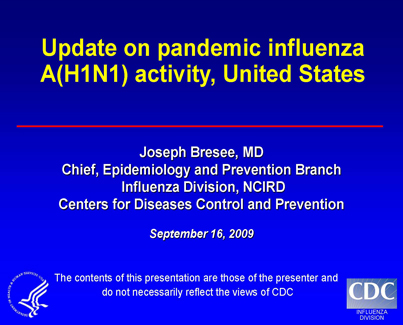CDC Influenza Division
- Joseph Bresee, MD, Chief, Epidemiology and Prevention Branch, Influenza Division, NCIRD
- 41 pages
- For Official Use Only
- Internal Use Only
- Sensitive But Unclassified
- September 16, 2009
Neuraminidase Inhibitors
• Oseltamivir (Tamiflu) and Zanamivir (Relenza)
• Randomized clinical trials (RCT): Reduced duration of influenza by 1-1.5 days when administered in 48 hours
• Pooled RCT analysis: Reduced lower respiratory tract complications, pneumonia, and hospitalization
• Observational studies*: Oseltamivir reduced mortality among hospitalized adults with lab-confirmed seasonal influenza A virus infectionsOseltamivir (Tamiflu)
• Oral medication: capsule or suspension
• Capsule may also be compounded into an oral suspension
• Pediatric dosage depends on age and weight
• FDA approved in persons aged ≥1 year
• Emergency Use Authorization (EUA) approved for use in persons <1 year
• Side effects include nausea, vomiting
– Reports of neuropsychiatric events (Japan)
• Precautions
– People with kidney disease (reduce dose)
– Pregnant or nursing women (safety not well studied)Zanamivir (Relenza)
• Orally inhaled powder –via special device
• FDA approved for:
• treatment of seasonal influenza (>7 years)
• prevention of seasonal influenza (>5 years)
• EUA expands treatment indication to hospitalized patients and patients symptomatic for more than 2 days
– Treatment after 48 hours of symptom onset is still useful in hospitalized patients
• Side effects: wheezing, breathing problems
• Precautions
• Chronic respiratory disease (bronchospasm)
• Pregnant or nursing women (safety not well studied)…





